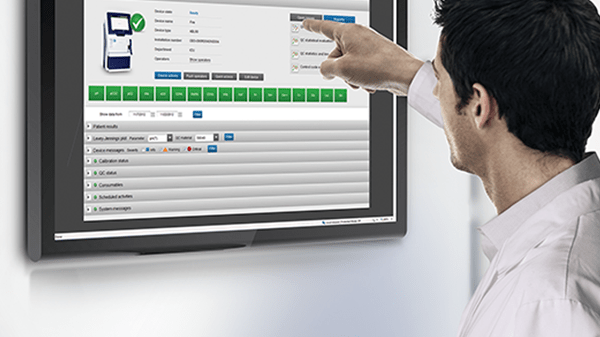
The point-of-care IT solution that benefits the POCC and the patient
Point-of-care IT solution supports the management of operators and sample data
With the responsibility of managing clinical laboratory and point-of-care testing (POCT), Professor Dr. Astrid Petersmann, Universitätsmedizin Oldenburg and Greifswald has the support of her IT solutions to keep things running smoothly.
To manage POCT at the hospital, Prof. Dr. Petersmann asserts that the following elements are valuable:
- Managing POC operators and their competencies and being notified on issues
- Seeing an overview of both Radiometer and non-Radiometer devices
- Matching the test results to the right patient
Prof. Dr. Petersmann and her colleague, Dr. Sven-Olaf Kuhn, talk about the point-of-care testing experience at the hospital.
Curious about how the POCT set-up benefits Prof. Dr. Petersmann? Watch the video to find out. Continue reading the story below.
With regard to point-of-care testing it’s very important to me that products are compatible with one another, that the user is assisted in handling them, but that they also account for our analytical requirements from the lab
- Professor Dr. Astrid Petersmann, Universitätsmedizin Oldenburg and Greifswald
Click here to renew consent
Essentials for the POC IT solution
Three things are essential for Prof. Dr. Petersmann:
- Ensuring only trained nurses perform POCT
- Monitoring of analysers in a single set-up
- Ruling out patient-sample mix-ups
A solution that supports the three priorities would be a huge benefit to the hospital and its patients.
Prof. Dr. Petersmann further discussed features that would be relevant for POCT. These features include connectivity to non-Radiometer analysers, such as glucometers and coagulation devices.
We use Radiometer to monitor point-of-care testing. It’s such an important tool for us because we can connect it to a wide array of devices, from blood gas analysers or troponin testing via the AQT90 FLEX, to devices from other vendors, like glucometers and devices that measure coagulation. It is all brought together in one overview and we can see everything at a glance, even if the equipment comes from different companies.
- Professor Dr. Astrid Petersmann, Universitätsmedizin Oldenburg and Greifswald
A more proactive approach to managing point-of-care testing
You have a patient information system, or a hospital information system, with which the hospital works. You have a lab information system and you have to have a monitoring system for point-of-care testing that is integrated into that. AQURE does that excellently in that it can use the interfaces of both systems and transfer the values safely to where they belong.
- Professor Dr. Astrid Petersmann, Universitätsmedizin Oldenburg and Greifswald
Read more
Cookies are used on this website
Use of cookiesPlease enter a valid email
We will be sending an e-mail invitation to you shortly to sign in using Microsoft Azure AD.
It seems that your e-mail is not registered with us
Please click "Get started" in the e-mail to complete the registration process
Radiometer is using Microsoft AZURE Active Directory to authenticate users
Radiometer uses Azure AD to provide our customers and partners secure access to documents, resources, and other services on our customer portal.
If your organization is already using Azure AD you can use the same credentials to access Radiometer's customer portal.
Key benefits
- Allow the use of existing Active Directory credentials
- Single-sign on experience
- Use same credentials to access future services
Request access
You will receive an invitation to access our services via e-mail when your request has been approved.
When you accept the invitation, and your organization is already using AZURE AD, you can use the same credentials to access Radiometer's customer portal. Otherwise, a one-time password will be sent via e-mail to sign in.



